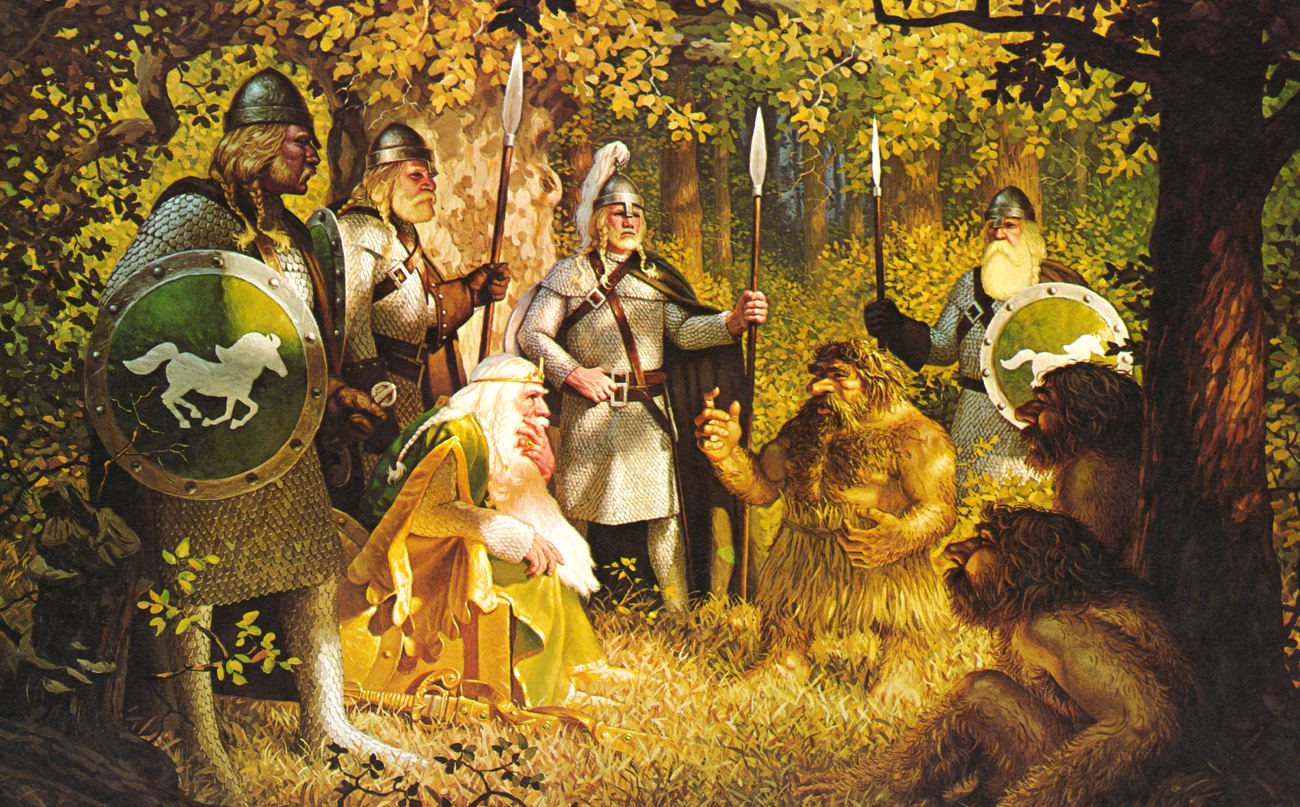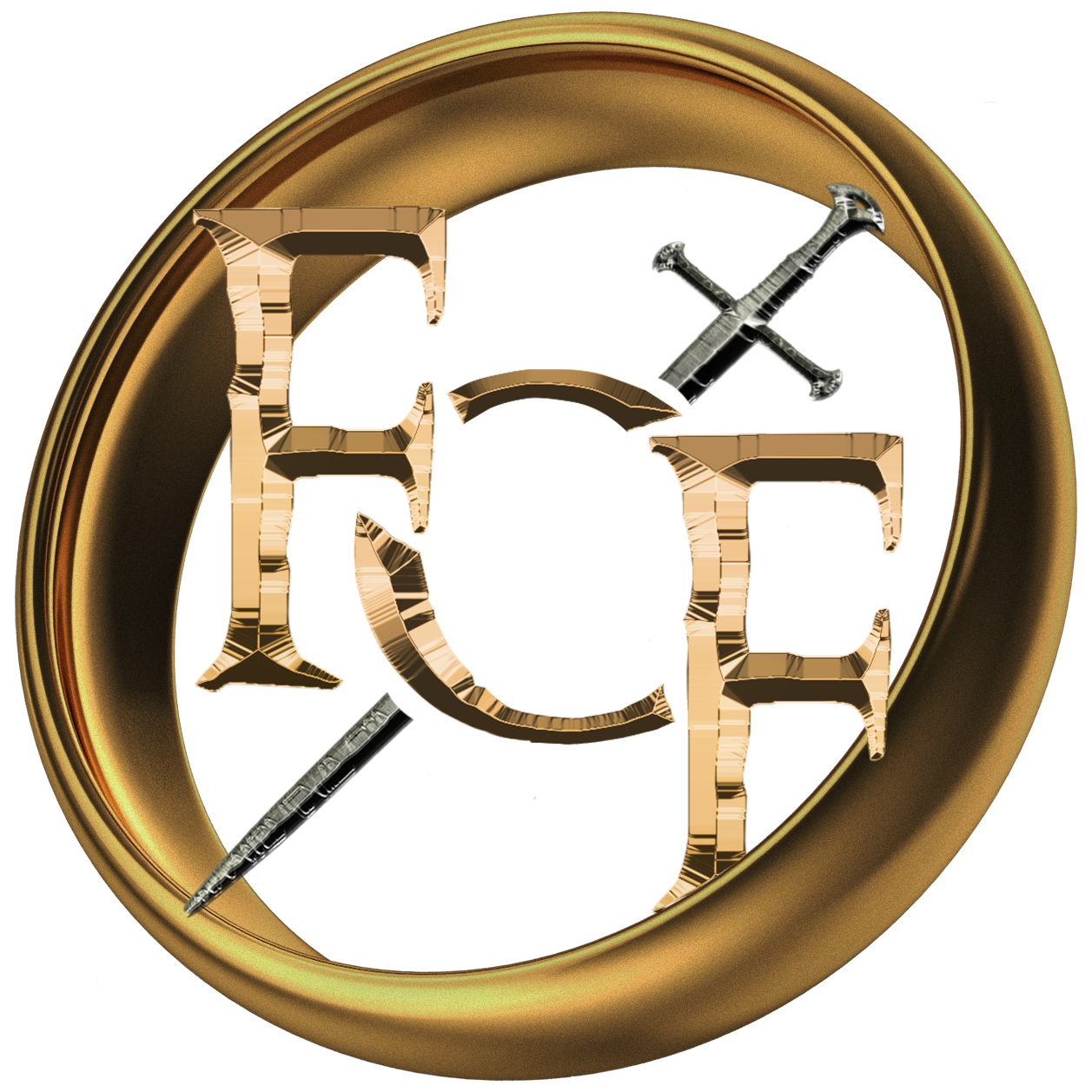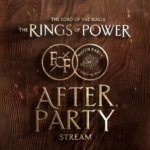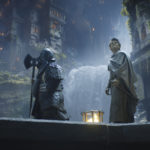
On the Threshold of The Rings of Power
“Wind is changing!”
―Ghân-buri-Ghân, The Return of the King
The Story of a Tolkien Fan
It seems difficult to believe, but after years of uncertainty and doubt, we are finally on the threshold of a new era in Tolkien adaptations. For me this story began long ago, with a calendar full of wondrous illustrations (including the one above, by the Brothers Hildebrandt), then a story about a dragon’s hoard my mother read me, followed by a couple of animated television specials my grandfather taped. It continued as I read the sequel to the story of the dragon’s hoard for the first time on my own, then delved greedily right through the appendices. I even made an attempt at the posthumously-published mythology, but the map was different, and I was largely unaware of how the two stories were connected, apart from a few recognizable character names.
I began developing maps, stories, and languages of my own. I gained an appreciation of phonetics and phonology (beginning with Scottish Gaelic, which Tolkien did not care for), and I loved experimenting with different syntaxes. Though I preferred prose far above poetry (when not set to music), I gained a taste for alliterative verse. I even gained a new appreciation of Tolkien from an unexpected source: An Introduction to Old Norse by E.V. Gordon (who it turns out was Tolkien’s pal at the University of Leeds). I loved history, but like Tolkien there was always something pushing me in the direction of language.
I watched the films with extended family when they came out. Tolkien was on my mind, and on the minds of my relatives, and he was often included in my family holiday celebrations, whether it was a Middle-earth reference book as a Christmas gift, or Elven names (and the decidedly non-Elven “Figwit”) turning up in letters from Santa Claus. I became familiar with works by Tolkien scholars such as Thomas Shippey and Michael Drout, as well as Tolkien himself, and I once wrote a paper on Tolkien’s dragon-hoard poem, Iúmonna gold, galdre bewunden. (Only the title is in Old English.) I even began a tradition of using places in Middle-earth as hostnames for my personal computer systems.
A New Tale
That’s my story, part of it. As Tolkien fans we all have our stories that have brought us to this point in time, with varying degrees of excitement, concern, and even outright contempt for this new adaptation, Amazon Studios’ The Lord of the Rings: The Rings of Power. Early impressions from a handful of premieres and other private screenings seem to have been largely favorable. However, with fan screenings in 200 theaters worldwide, detailed reviews as the embargo lifts, and finally the release of the first two episodes on Amazon Prime Video, in a few short days the small number of people who have seen these episodes so far will be dwarfed by the multitudes of ordinary fans―and even the merely curious―who will watch them, and who will be able to decide for themselves what they think of them. And, in less than two months’ time, all the secrets of Season 1 that have been kept for so long will (despite the Morbius memes) quickly become known far and wide, just as “Baby Yoda” was. Whether the show will be as well received as The Mandalorian was, however, remains to be seen.
I have not seen any part of The Rings of Power beyond the teasers, trailers, and other clips that have been released to the general public, nor will I before the worldwide release on Amazon Prime Video. But I will watch the show soon enough. As a fan of Tolkien’s works, I’m not waiting for any critic or influencer to give me the go ahead before I watch for myself and decide what I think. I will also be discussing the episodes in future weeks. This marks a change from some of my previous articles on this site. Previously many of my articles were about the Second Age as described by J.R.R. Tolkien. Henceforward I will be examining the Second Age as depicted in The Rings of Power. I will be making reference to Tolkien’s writing’s, of course, but with the purpose of discussing Amazon’s adaptation in particular. Several aspects of the show that I will focus on include: languages and names, historical transmission, geography, elements from the source material, deviations from the source material, the effects of time compression, themes of the Second Age, philosophy, and my thoughts on why the showrunners and writers made the adaptation choices they did, and how effective I think they were.
Spoiler Policy
Because I will be discussing episodes of the show, I will be including spoilers from those episodes, or any previous episodes. However, I will still attempt to avoid spoilers that come from Tolkien’s writings, particularly those writings covering the Second Age, as long as they have not yet been revealed in the show. Within reason, of course. I mean, it shouldn’t be a spoiler to say that the Second Age was not 3441 years of uninterrupted peace; otherwise there wouldn’t be much of a show.
Language and Names
Language is one of my abiding interests, so naturally I am curious to what extent the show makes use of Tolkien’s invented languages and writing systems, as well as languages potentially invented for the show, and writing systems that have certainly been invented for the show. If a language is invented for the show, how well does it fit in with Tolkien’s existing languages? When do the actors speak English, and when do they speak some other language? Does everyone automatically understand everyone else when they first meet, or are there language barriers? What is the translation convention? Is there a single point-of-view language, such as Sindarin, or does the point-of-view language vary depending on the location or group of characters? Or is this something the show’s creators seem not to have thought of?
Regarding the names, how were they created? Were they devised from Tolkien’s invented languages, from real-world elements, or seemingly from scratch? Do they have meaning, or at least consistency of phonology in areas where people presumably speak the same language? I have already given some of my thoughts about how I think an adaptation of the Second Age should approach Mannish languages, such as the languages of the Northmen (Proto-Germanic) or the Gwathuirim (Proto-Celtic). Recently, however, it has occurred to me that my own musings on translation convention offer another approach. If Modern English represents a language other than the Common Speech (Westron) as it was spoken in the late Third Age, then it stands to reason that, because our temporal reference point has shifted backwards, the referents for the languages related to Modern English should also shift backwards. In other words, if Modern English represents Adûnaic as spoken on Númenor in the middle of the Second Age, then perhaps Old English (or Old Norse) could represent the language of the Northmen at the same time, rather than Proto-Germanic, as I had suggested. Likewise, the language of the Gwathuirim could perhaps be represented by a Medieval Celtic language, rather than by Proto-Celtic. This is, of course, assuming that such people will have a part in the show. For now our principal non-Númenórean population is the Southlanders of Tirharad and thereabouts, and I would like to analyze more names from these people (and their language, if they are shown to speak something other than English) before reaching any conclusions.
Historical Transmission
In the Peter Jackson films it is rather apparent that the story we are being told is found within the pages of the Red Book that Bilbo and Frodo write in, which Frodo then gives to Sam. The Rings of Power, however, has an ensemble cast, scattered in various locations. Are these stories all brought into one narrative that is then presumably passed down to us? What about the Harfoots’ story? It would go against lore for Elrond, say, to have the account of their story. Was their story transmitted separately? Perhaps as an old Hobbit song? Or is this something the showrunners and writers have not considered, or at least bothered to address? Of course, the answer to this question may not be known at all until the final season.
Geography
Where, in Middle-earth and elsewhere in Arda, do the events of The Rings of Power take place? This is something we now know fairly well, thanks to promotional materials that have been released on the various locations. Still, there may be other locations that come as a surprise. Also, some people will be moving from place to place. Does their movement seem reasonable and consistent with what we know of the geography, or are characters being seemingly teleported from one location to another for plot reasons?
Elements From the Source Material
From initial reports, the first two episodes will introduce us to quite a bit of lore, including a roughly 10-minute depiction of the events of the First Age. What events and characters are introduced from the backstory to the Second Age? Also, what events that occur in the show are actually taken directly from the lore, whether from the narrative of The Lord of the Rings itself, the Appendices, or other works to which Amazon would need special permission, such as The Silmarillion, Unfinished Tales of Númenor and Middle-earth, The Peoples of Middle-earth, or whatever? It may not be possible to draw up an exhaustive list of such inclusions, but I will try to draw attention to those that I feel are the most notable.
Deviations From the Source Material
How does Amazon’s retelling of events in each episode differ from any version of what Tolkien himself wrote? As above, it may not be possible to draw up an exhaustive list of such deviations, but I will try to note the most striking or egregious changes that I see.
The Effects of Time Compression
How much time passes in each episode? Are we told, or is it left to the viewer to determine? How do the writers deal with themes such as the immortality of the Elves, the mortality of Men, or the changing ideology of Númenor in a show that is set in such a relatively small period of time?
Themes of the Second Age
Tolkien’s writings on the Second Age cover several important themes such as immortality, death, and the fear of death; change and stagnation; freedom and order; pride and corruption, and so on. How are the writers using the medium of (digital) film to introduce us to such weighty themes? Or are they largely avoiding them to spend time on action, humor, or whatever?
Philosophy
What is the show’s philosophy, to the extent that it can be determined? Are there multiple competing philosophies, with no one philosophy indicated as the correct one, or is the show trying to push us to follow one particular philosophy? Does the show seem to be in a respectful dialog with Tolkien’s philosophy, or does it seem to wish to replace it with one more to the liking of Amazon, or of a modern audience? Or does it avoid philosophy altogether to focus on thrills?
Adaptation Choices
Where the show diverges from what Tolkien has written, or where it is at least clearly doing its own thing, what could be a reason for the change? Was it needed to make the change from a written work to a screen adaptation, or was there another reason for it? Was the adaptation choice effective? (Example: Many people have found the death scene of Boromir in The Fellowship of the Ring film quite moving, though it differs from the scene in The Two Towers book.)
With luck, by the next time I post, I will have seen the first two episodes of The Rings of Power. Till then, Wesaþ ġé hále!




No Comments